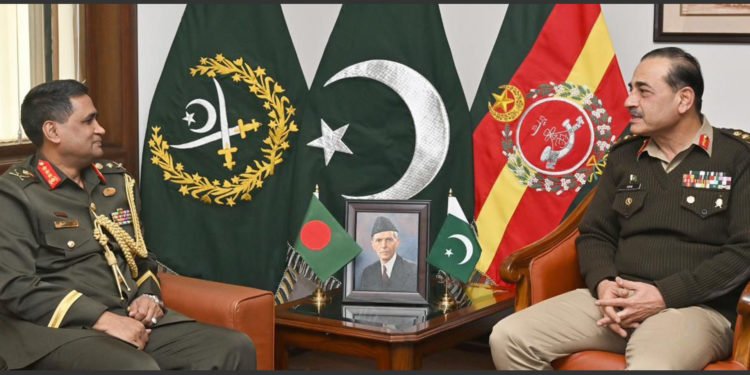Since the ousting of Sheikh Hasina,A New Chapter in Bangladesh-Pakistan Military Relations Post-1971 and Geopolitical Implications Islamabad, Pakistan
a meeting was held between Pakistan's Army Chief General Asim Munir and Bangladesh’s Lieutenant General S M Kamrul Hasan, with the national flags of both countries displayed on the table.
Since the ousting of Sheikh Hasina,A New Chapter in Bangladesh-Pakistan Military Relations Post-1971 and Geopolitical Implications Islamabad, Pakistan
Since the ousting of Sheikh Hasina,A New Chapter in Bangladesh-Pakistan Military Relations Post-1971 and Geopolitical Implications Islamabad, Pakistan – Since the ousting of Sheikh Hasina, ties between Bangladesh and Pakistan have grown closer, with both countries’ politics increasingly influenced by anti-India sentiments. On Tuesday, a meeting was held between Pakistan's Army Chief General Asim Munir and Bangladesh’s Lieutenant General S M Kamrul Hasan, with the national flags of both countries displayed on the table.
Hasan’s visit to Islamabad marked a significant point where he met with Pakistani military officials. The Pakistani military’s media wing described the meeting as a relationship between "brotherly nations." However, for most of the past 54 years, Dhaka and Islamabad have not viewed their relationship in this way, particularly since the Bangladesh Liberation War.
During Sheikh Hasina’s nearly 16-year rule, tensions between Bangladesh and Pakistan intensified. Hasina was ousted following widespread protests in August and fled to neighboring India. Since her departure, Bangladesh and Pakistan have drawn closer. A statement from the Pakistani military indicated that Munir and Hasan emphasized the importance of strengthening military relations and pledged to keep this partnership free from any external disruptions.
This was part of a series of high-level meetings between the two countries. Pakistani Prime Minister Shahbaz Sharif met with Bangladesh's interim government chief Muhammad Yunus at an international summit in Cairo last month. They also met on the sidelines of the UN General Assembly in September. Pakistan’s Foreign Minister Ishaq Dar is scheduled to visit Bangladesh next month, marking the first visit of its kind since 2012. Analysts believe that the geopolitical landscape in South Asia could shift as a result.
Resolving Historical Issues
The animosity that arose during Bangladesh's Liberation War in 1971 stems from the war-time genocide and atrocities. During the war, Pakistan's military and allied militias killed hundreds of thousands and committed atrocities against women. These issues have resurfaced repeatedly since Bangladesh's independence. In his meeting with Sharif in Cairo, Yunus called on Pakistan to resolve longstanding issues.
Since Bangladesh’s independence, Pakistan has not formally apologized, which remains a significant barrier in their relations. Additionally, issues over the distribution of pre-1971 assets and the repatriation of Urdu-speaking Pakistanis persist.
Changing Dynamics
Former Pakistani diplomat Ashraf Qureshi told Al Jazeera, "With deteriorating relations with India, Bangladesh’s new administration might reconsider its policies." Bangladesh’s interim government has recently asked India to hand over Sheikh Hasina for “judicial proceedings.”
India has yet to respond to this request. India has repeatedly expressed concerns about the safety of Bangladesh’s Hindu community, who traditionally support the Awami League. Bangladeshi authorities have dismissed these concerns, attributing them to false information spread by the Indian media.
Qureshi noted, "Bangladesh operates based on geographical and economic realities. They might adopt an independent policy, but it is unlikely they will take a stance against India." Walter Ludwig, a senior lecturer at King’s College London, concurred, stating, "Before we see actual policy changes, there needs to be a reassessment of regional geopolitics."
India's Engagement with the Taliban
Amid Bangladesh’s growing closeness with Pakistan, there are further changes in South Asia’s geopolitical dynamics. Recently, India has increased its engagement with the Taliban. Pakistan's influence over the Taliban has waned, leading to increased tensions between the two countries.
Former Pakistani diplomat Burhanul Islam commented, "After Hasina’s ousting, Bangladesh is seeking military support and security. The military leadership of both countries is keen on improving relations."
Economic Prospects
Ludwig believes that Bangladesh’s economic growth may be a factor in improving relations with Pakistan. Since 2021, Bangladesh’s growth rate has been 6%, whereas Pakistan achieved only 2.5% growth last year.










